
 |
Freethought & Rationalism ArchiveThe archives are read only. |
|
|
#1 | ||||||||||||||||||||||||||||||||||
|
Veteran Member
Join Date: Mar 2002
Location: Perth
Posts: 1,779
|
Greetings all,
So I have looked into the ancient sources, especially around the time of Paul and the early Christians, to see if the matrix of ideas and beliefs for Earl Doherty' sub-lunar (non-physical) incarnation theory of Jesus can be found in writings of the time. I have used computer searches to seek out key phrases for my quotes, to show that the elements of such a theory were known and discussed around the time of Paul. I have also included later quotes, if they confirm earlier comments. Of course the authors quoted generally don't support a sub-lunar incarnation of Jesus - because it was Paul who crafted this original conception from that matrix of ideas. I have used capitals for the key terms to emphasize their nature as specific, formal, named regions. Disclaimer: I do support Earl's theory, and I often champion his views, and sometimes use his work for sources. I have occasionally been in touch with Earl, even recently when I suggested a few web fora to him. But this essay was written from my personal research of the sources; and occasional reference to Earl's works - any errors are mine. I've started a new thread, for dealing with just this specific subject. Anyone is free to duplicate or post or distribute this essay, provide they attribute it to 'Kapyong'. Ancient Greek philosophers divided the Universe into a broad dichotomy - * Above the Moon - divine, eternal, immortal, unchangeable, ethereal, spiritual, pure, light, divine providence * Beneath the Moon - material, changeable, mortal, corruptible, impure, dark, unreasoned, fortune, reproduction, destruction, perishable, ageing Here are some quotes showing these various distinctions : Quote:
Quote:
Quote:
Quote:
Quote:
Quote:
Quote:
Quote:
Quote:
Quote:
Here is a simple diagram of this dichotomy : 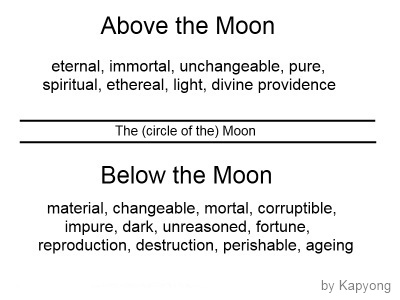 The region Below the Moon or the 'sublunary region' has the Earth as it central part (these are usually seen as concentric spheres, rather than flat layers shown on my simple diagram) : Quote:
Quote:
Air is Beneath the Moon - and between the Earth and Moon Air fills the empty regions Below the Moon, between the Earth and the Moon, separating them : Quote:
Quote:
Quote:
Quote:
Air is, at least in part, adjacent to Earth. Quote:
Quote:
Quote:
Quote:
Shown in a diagram, it seems like this : 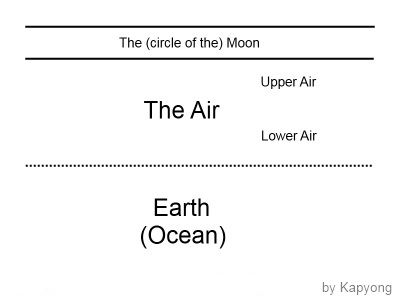 Completing The Picture There are also the following spheres or worlds to add : * The underworld (Hades, Tartarus, Elysium) * The Planetary Spheres * The Empyrean (a late term for the highest sphere) This gives a picture like so : 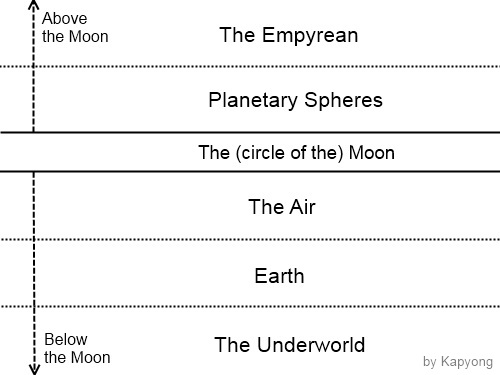 This is my summation of the classical view - but not everyone saw it exactly the same - some early writers locate Hades Under the Moon, at the Moon, or even on the far side. The Air is filled with living beings and things and events It should be clear that the Air is not the same as the mundane air i.e. atmosphere, (although it developed from it.) The atmosphere was generally seen as being the highest physical later of Earth, and perhaps co-mingling with the lower Air. In the Air are many living beings - invisible souls, demons, spirits, angels - they can see us, but we generally cannot see them : Quote:
Quote:
Quote:
Quote:
Quote:
Quote:
Quote:
Non-Physical Actions Occur in the Air Various sorts of (non-physical) actions are performed by the beings in the Air - especially related to death, punishment, and birth. Demons punish souls in lakes in the Air : Quote:
Quote:
Quote:
Quote:
All life on Earth is affected from the Air Air is filled with the seeds of vitality, vital spirit, and is productive of life due to God's special favour : Quote:
Quote:
Quote:
Conclusion : By Paul's time, the following beliefs were known and discussed :
Next, I will look specifically into the Christian view of such things as the firmament and heavens etc. Kapyong |
||||||||||||||||||||||||||||||||||
|
|
|
|
#2 |
|
Regular Member
Join Date: Dec 2006
Location: Brooklyn
Posts: 237
|
Thanks Kapyong, I look forward to reading more.
Gregg |
|
|
|
|
#3 |
|
Contributor
Join Date: Mar 2004
Location: Dallas, TX
Posts: 11,525
|
Very nice. I certainly haven't seen such a comprehensive collection of these ideas.
|
|
|
|
|
#4 |
|
Regular Member
Join Date: Jan 2004
Location: Washington
Posts: 250
|
Excellent post, Kapyong.
|
|
|
|
|
#5 | ||||
|
Contributor
Join Date: Mar 2006
Location: Falls Creek, Oz.
Posts: 11,192
|
Quote:
G'day Kapyong, Am impressed very much by all of this. Many thanks. Love the diagrams. I have a cupla questions and a few more cites that may be relevant to your collection. But first a quick Q about "Paul's time" ..... Before you get into the "Christian stuff" I'd like to make the chronology explicit. Quote:
Further data from Pythagoras The following has been sourced from Page 272 of "A History of Greek Philosophy", Volume I: The Earlier PreSocratics and the Pythagoreans (or via: amazon.co.uk) - by W.K.C. GUTHRIE (Published 1962) . Although this may not be directly relevant, I thought I'd mention that Pythagoras makes reference to the "Counter-Earth" and to a hierarchy of elements associated with the "earth, water, air" -- the "fire" which they held to be as the "Central Hearth" and also to a 5th element, called the "aether" which they associated with the heavenly realms - the cosmic element. (Referenced from writings by Aristotle on the Pythagoreans ... Aetius III,II,3 (DK,44a,17)) This 5th element is sometimes seen as similar to the Indian "akasha" or space. Pythagoras derived the world from the fire and the fifth element" The Pythagoreans held that the cosmos "Breathed in" from the Infinite Breath outside it: the "aither" Quote:
Quote:
|
||||
|
|
|
|
#6 | |||||||||||||||||||||||||||||
|
Veteran Member
Join Date: Mar 2002
Location: Perth
Posts: 1,779
|
Greetings all,
This essay follows my previous one on "The Air Beneath the Moon", in which I discussed how the Ancient Greeks divided the world into spheres of existence, with a broad division into two two fundamental layers :
Jewish and Christians writers expressed some similar ideas, but divided by the Firmament instead of the Moon. Many writers were apparently influenced by the dividing of the waters from Genesis, in the context of a division or dichotomy in the universe. The Firmament divides the Waters of Above and Below The Firmament is called Heaven and divides the Waters Above from the Waters Below - many Christians quote Genesis : Quote:
Quote:
Quote:
Quote:
The Waters Above and the Waters Below It's not really clear specifically what this division represented in earlier times - by later times, various opinions arose - Some said the Waters Above represents the Spiritual Perfect Man : Quote:
Quote:
Quote:
The higher regions of the Waters Above are Above the Firmament. The lower regions of the Waters Below are Under the Heaven. Quote:
Above the Firmament There are regions, heavens, beings and actions Above the Firmament : There is a region Above the Firmament : Quote:
Quote:
Quote:
Quote:
The Firmament of Heaven could refer to the entirety of the sensible world : Quote:
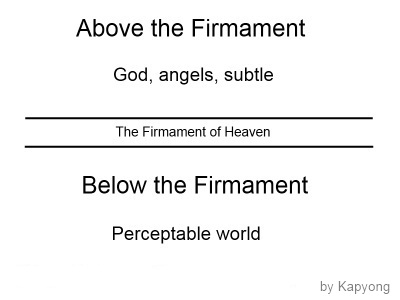 Obviously quite similar to the Greek view at the time :  What's IN the Firmament ? In some early books God himself is in the Firmament : Quote:
Quote:
Quote:
Quote:
Above the Heavens are the Holy Ones - where it's Divine, Spiritual Holy and spiritual beings are found Above the Heavens : Quote:
Quote:
Quote:
Quote:
Quote:
Upper and Lower Heavens Before Paul, belief in heavens above and below the Firmament arose : Quote:
Quote:
Later, Nag Hammadi tells us that the Seventh Heaven is below the Veil of Above and Below. Quote:
But the four higher heavens are brighter and without comparison to the lower three : Quote:
Quote:
The Third Heaven Back to Paul's time, we see a reference specifically to Paradise in the Third Heaven - Quote:
Quote:
The Christian Spheres of Existence in Paul's time So, putting this all together, I conclude Paul probably saw the universe as being somewhat as follows : 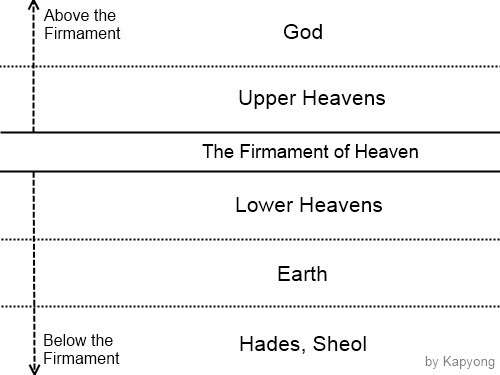 Once again, we see this has much similarity to the Greek view :  The main difference is that the various planetary spheres and the stars are all combined in the (solid) Firmament. The Greeks tended to multiply spheres, whereas the Christians tended to multiply heavens. Clearly, the Christian cosmology is similar to, and partially derived from, the Greek one. Conclusion : By Paul's time, the following Christian and Jewish beliefs were discussed :
Along with the similar beliefs discussed in the previous part :
Next I will be looking into the Heavenly Jerusalem. (Anyone is free to duplicate or post or quote this essay provided they attribute it to Kapyong.) Kapyong |
|||||||||||||||||||||||||||||
|
|
|
|
#7 | ||||||||
|
Veteran Member
Join Date: Mar 2002
Location: Perth
Posts: 1,779
|
Greetings all,
Here is a little essay on Paul's Heavens, building on from the previous two. Paul's Heavens So we have seen how the Christian and Greek spheres of existence could be seen (not that everyone saw it the same way - I am focussing on Paul's time and Paul's words. On of the writers that combines Jewish/Christian with Greek thought is Philo ("Mr Love") who was a direct contemporary of Paul and wrote many works which are considered almost proto-Christian - some later writers considered Philo WAS a Christian. Now let's look at Philo's fascinating comments about Jacob's Ladder - Jacob's Ladder is the Air In Christian tradition, Jacob's Ladder is in heaven : Quote:
Quote:
Quote:
Quote:
Basil the Great, Homilies, 4th C. : Quote:
From all this, we get a picture like so: 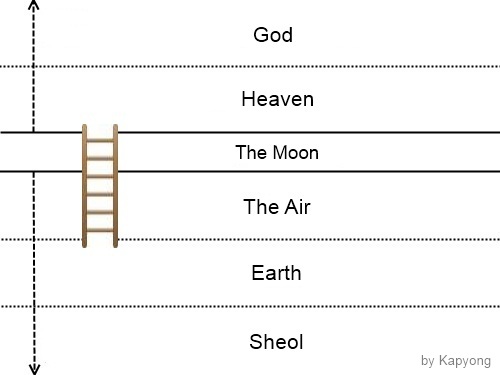 The Third Heaven In Paul's time, there was reference specifically to Paradise in the Third Heaven - Quote:
Quote:
I conclude that Paul's Third Heaven is the Heaven Above the firmament and that Paul sees the heavens like so : 3. The Heaven Above the Firmament Satan and spiritual forces of the Air Christians saw Satan as being a power in the Air - this is clearly carried over from Greek beliefs about demons in the Air. Many Christians quote the following passages : Quote:
Flesh vs Spirit Paul often uses a dichotomy of Flesh vs Spirit and this is much discussed. I think Paul's Flesh---Spirit, is like the Greek Below--Above the Moon, and the Jewish/Christian Below--Above the Firmament. Combining all these ideas here, is what I think Paul saw as his Universe : 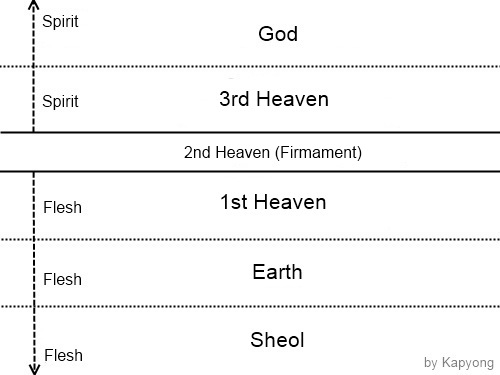 I have repeated the Flesh and Spirit to show how these divisions apply across multiple spheres - including how the 1st Heaven, the Heaven Below the Firmament, is within 'Flesh'. Kapyong |
||||||||
|
|
|
|
#8 | |||
|
Veteran Member
Join Date: Mar 2009
Location: England
Posts: 2,527
|
Quote:
|
|||
|
|
|
|
#9 | |||
|
Veteran Member
Join Date: Mar 2002
Location: Perth
Posts: 1,779
|
Gday Mary,
Quote:
I just think Paul is saying : "Wow that was a bizarre experience - I went way to heaven, and I'm not even sure if I was in this body or not!" He just has some pre-occupation with bodies and flesh. Not always clear what he is raving about. Quote:
And, I don't think Paul is formally a Middle Platonist, exactly. He just seems aware of various theological ideas and seems to think he has something to contribute. What Paul is - is a sui generis central Paulist. Who had a wild vision of heavens that inspired him to read other visions and apocalypses, who was schizoid or drug-crazed or something, and who had great imaginative visions and ideas that he wanted to express. People love that sort of stuff - if you've been to heaven, if you met angels, or had messages from hidden masters, or taken photographs of faeries .. people BELIEVE, people want to know more, people want to have those experiences. I think Paul's central creative idea is that : *SARX is everything below the Firmament (and that *SARX includes the Lower Heaven where angels and beings do things that affect us.) Quote:
K. |
|||
|
|
|
|
#10 | |||||
|
Veteran Member
Join Date: Mar 2009
Location: England
Posts: 2,527
|
Quote:
Quote:
Quote:
|
|||||
|
|
| Thread Tools | Search this Thread |
|